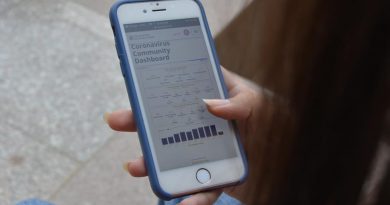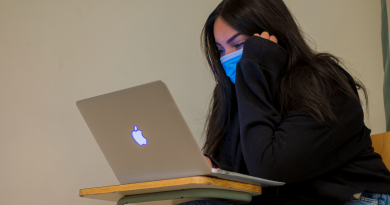Don’t Put Off Work During Ramadan, Experts Say
Reporter: Mariam Amgad

A number of students have told The Caravan that they are concerned about how to juggle the balance between fasting, and its dietary impact, and doing coursework during Ramadan.
Some said they thought about skipping 8:30 am classes, while others feared that handing in assignments late because their study habits will be impacted negatively and affect their academic performance.
According to the University of Illinois in Chicago, fasting can lead to increased fatigue and decreased energy levels, which can negatively affect academic performance.
Students with a fixed routine tend to struggle more during Ramadan due to long fasting hours and lack of sleep.
Photographer: Omar Abozeid
“I drink a lot of coffee throughout the day, and I believe without it in Ramadan it will hinder my concentration in class while fasting,” says Omar Megahed, Electronics, and Communication Engineering major.
However, many students claim that they are developing strategies for juggling the piety of fasting and studying, and they think that Ramadan may actually unlock
a number of benefits for maintaining a better lifestyle.
They say that in order to continue performing other Ramadan rituals, it is sometimes advantageous to work while fasting rather than waste time doing nothing.Then there are the health advantages of fasting during Ramadan.
“If done correctly, fasting can have a significant beneficial effect on one’s health by enhancing digestion and fostering the growth of microbiota, the beneficial bacteria that lives in the digestive system,” says Dr. Maha Shahin, a nutritionist working at the Dr. Osama Taha Bariatric Group.
Microbiota is also known to boost the immune system.
According to the US-based Cleveland Clinic, “fasting not only uses your fat reserves but also cleanses your body of harmful toxins that might be present in fat deposits. With the digestive system on a month-long overhaul, your body naturally detoxifies, giving you the opportunity to continue a healthier lifestyle beyond Ramadan.”
Nutritionist Mark Andria agrees.
“As blood sugar is low for the majority of the day, fasting reduces insulin resistance,” he says.
Beyond the dietary and nutritional benefits, students say that time management is critical.
While early morning starts might cause all of the day’s energy to be used up in the first couple of hours, students are adapting by putting off work until later.
Architecture major Karim Amr says he finds it difficult to function while fasting during Ramadan and that classes consume all of his energy.
“So I leave all of the studying and assignments till after iftar, which generally ends up being done around midnight.”
Not only are some assignments easier to complete after iftar, but some classes are also held later. Instead of watching television shows and staying out late with friends, some students prefer to attend classes after iftar.
“Late classes have different vibes, we come with desserts and are full of energy, but I wouldn’t like all my classes to be at night because I’d rather spend this time with my family,” added El-Naggar.
Priorities can easily get lost amidst the frenzied celebrations of Ramadan in Egypt. People have a tendency to forget about their own education and work.
“Students tend to prioritize Ramadan’s distractions, such as sohour with friends, family gatherings, and TV shows, overwork,” says Yousra Bakr, assistant professor of Integrated Marketing Communication, who is scheduled to give class before and after iftar this semester.
But she says that while she gives classes before and after iftar, students perform better while they’re not fasting.
“I could sense the difference in energy.”
Students may experience a decrease in their productivity when fasting; nevertheless, they will eventually adjust to this change. Establishing a schedule for studying and working based on individual needs becomes important.
“When a student is fasting, they deprive their body of vital minerals and vitamins that help them concentrate and perform better for both mental and physical work. It may be difficult at first, but eventually, the body adapts to the new routine,” said Ashraf Foda, assistant professor of Integrated Marketing Communication.
Meanwhile, research has shown that individuals can obtain a variety of benefits from fasting, despite the fact that it can be challenging.
Dr. Shahin told The Caravan that fasting improves brain function and protects against neurological illnesses.
“When given with the body for a prolonged period of time, the body starts the process of glycogenesis; when this process is complete, the body begins to break down fatty acids; therefore, it is possible to lose weight when fasting. Nonetheless, throughout the month of Ramadan, when we eat after iftar, it is necessary to maintain a healthy diet,” she said.


